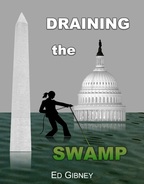Government is created to regulate the markets for all goods and services in order to ensure the fundamental evolutionary principles of cooperation and competition are acting for the maximum benefit of all life.
That's the theory. Now it's time to put it into practice. We've seen all three US presidential debates, we've heard the campaign speeches, we've read the party platforms, and we know the candidates' histories. (Unless you are Donald Trump.) So how do the visions of Obama and Romney stack up against the ideal definition of government? Let's examine five major issues in order of long-term threats to our future.
Environment - Global warming's terrifying new math adds up to a global catastrophe, there's very little that we as individuals can do about that, and yet our presumptive leaders didn't even discuss it. That is an embarrassing condemnation of the state of American politics. Competition narrows focus to the short-term, which is exactly why extreme competition is such a detriment to the future of a species. Well, this election season and its dismissal of long-term concerns is a prime example of that. Advantage: no one. (Although currently, the Democratic party does lean more towards protecting the environment than pro-business Republicans do.)
Societal Inequality - There is no question that extreme social inequality leads to revolution - a destructive in-fighting of citizens that leads to decades, if not centuries, of pain and mistrust. The question is, what defines "extreme"? I don't think there is a simple answer to that, but when America leads the developed world in social inequality, movements like Occupy Wall Street are growing and openly advocating revolution, and frustration over Congressional inaction is rising, I think it's safe to say, we are edging closer to an "extreme" situation. In the face of this, Obama proposes tax increases on the wealthy, Romney proposes more tax cuts. Obama wants to extend unemployment benefits, Romney and Ryan want people to stand on the own. Advantage: Obama.
Debt - Bankrupting a country leads to mass pain and suffering for citizens who see life savings wiped out, social safety benefits taken away, and an inability to invest in the future of the country. We have seen this in waves of debt crises over the last several decades - Argentina, Russia, Thailand, Greece, etc., etc. The world economy has recovered from each of these crises so far because there has always been a bigger lender to staunch the bleeding. If the US were to go bankrupt, and we are absolutely threatened with this, the pain felt around the world would certainly be much worse. Both political parties recognize this. Obama has repeatedly proposed a "Grand Bargain" to stabilize the debt trajectory with $2.50 in spending cuts for every $1.00 in revenue increases. Republican have rejected this every year, preferring instead to walk towards the debt cliff in the hope that the American public will blame Obama and vote to give them free reign to slash both spending and taxation. Republicans are refusing to cooperate because they believe only their ideas have merit. That heavily competitive strategy is very likely to fail, even if they were to win this election. Advantage: Obama. And the democrats.
International Relations - There was a time when this concern would have been much higher up the list. Nuclear standoffs between America and the Soviet Union posed an existential threat to the world. Now, nuclear arms are being reduced (behind a continued push from Obama), and increased economic ties between America, Europe, South America, Russia, and China, means an assurance of the mutual destruction of quality of life in the event of a breakout of any competitive war. In this new interconnected world, the greatest issue for international relations is the punishment of cheaters who threaten this economic cooperation, whether they be state sanctioned (North Korea, Iran, Syria) or uncontrolled by any state (Al Qaeda, Taliban, drug lords, mafia, pirates). In this type of world, cooperation with partners is paramount, while resolute and pragmatic action against cheaters is required. Obama has clearly displayed this deft balance. Romney has insisted Russia is our #1 geopolitical foe and seems to prefer driving them out of any possibility of cooperating with the rest of the world. Advantage: Obama.
Economy - It's the economy stupid. Or should that be it's the stupid economy? The current state of the economy is the ultimate short-term measuring stick by which to judge the state of a nation. How is my job? Can I expect to keep it 6 months from now? What will my investment portfolio look like after the next quarterly earnings report or monthly unemployment numbers? Short-term, short-term, short-term, short-term. There is no question that if you don't survive in the short-term, you can't make it to the long-term. But if you only ever concern yourself with the short-term, you will surely get it in the long-term as well. By continually kowtowing to the short-term demands of the economy, we have irked our neighbors (International Relations), failed to save (Debt), bent to moneyed interests (Social Inequality), and poisoned our atmosphere (Environment). Now, all of our long-term problems are coming to bear on the short-term economy. And what do we obsess over? The economy! We need to address our long-term structural issues in order to create the right kind of environment that assures short-term success. In order to fix the economy, we actually have to ignore the economy. And yet, the economy has been the center of the entire political discussion, even though presidents have very little effect on the economy. I'm so tired of hearing about it, I refuse to discuss the politician's stances on this topic, except to say that Mitt Romney was right when he said the president doesn't create jobs, before he was wrong when he said he would create jobs as the president.
I don't think it will be a surprise pick to say Obama and the democrats are the clear choice if you are looking for a candidate who wants to balance cooperation and competition in America. Republicans and free market capitalists worship the concept of competition as a panacea for progress, incentives, and even morality because of a misunderstanding (or flat denial) of the principles of evolution and the philosophy that results from that. Obama is not a perfect president, but in our two-party system, he is the best option.



